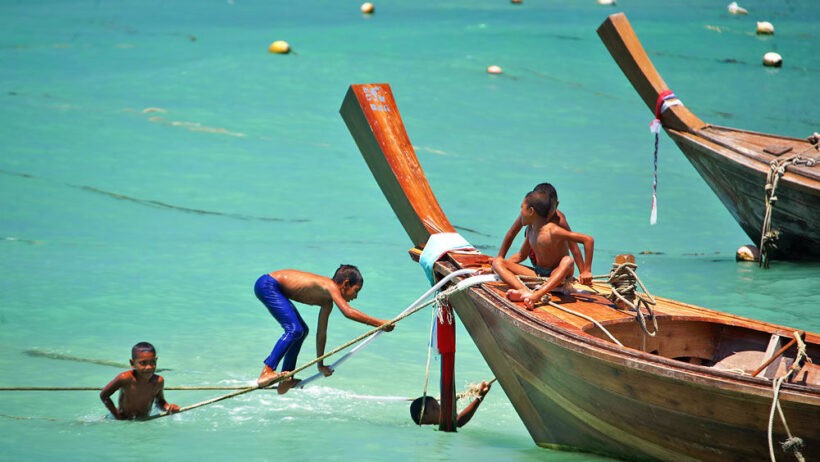Covid tourism standstill gives Thailand’s southern sea gypsies a break

Phuket’s sea gypsy communities are getting a much needed break after the Covid tourism standstill have their traditions a break from the tourism onslaught. 42 year old Sanan Changham says now there is an abundance of fish and shellfish to eat. Tourist boats have been docked at the quay, making fishing easier for the Chao Lay, or “people of the sea.“
“We don’t dive as deep as before, so it’s less dangerous.“
More than 9 million visitors came to Phuket in 2019, impacting the sea gypsies and their way of life, mostly located at the southern end of the island. The booming tourism brought a decline in fish stocks, decreasing fishing grounds and loud construction of hotels. And the traffic. Such hotels signal an even bigger threat to the 1,200 Chao Lay in Rawai, as property developers have tried to evict them from their ancestral strip of land that faces the sea.
Ngim Damrongkaset, a Rawai community representative, says he hopes the area where developers have taken a stake is abandoned.
“They want to drive us out of our homes, but also to deny us access to the sea.”
For the Chao Lay people, the fight to keep their land has been unequal as most are illiterate and were unaware of the fact that they could register their land, but the government is trying to help them. One way for authorities to buy the land and entrust it to them.
Narumon Arunotai, an anthropologist at Bangkok’s Chulalongkorn University, says the government must seize the opportunity provided by the pandemic to rethink their vision on Chao Lay.
“Covid is an opportunity to change mentalities. Mass tourism in Phuket has been a catastrophe for the sea gypsies.“
The land in Rawai was originally claimed by Indonesian ancestors of Sanan, before the island became flooded with international travellers. But since tourism has become more profitable, authorities have cracked down on the sea gypsies unless they are sailing in protected marine reserves.
“Before, we risked being arrested by a patrol or having our boats confiscated.“
For the animist Chao Lay the beach is a vital space where they keep their colourful wooden boats and where they pray and give thanks to their ancestors. But not only their unique cultural heritage has helped them navigate the waters.
The Chao Lay people are experts at detecting any abnormalities in the water, as such they were able to escape before the 2004 Boxing Day Tsunami hit, while saving loads of tourists. Furthermore, Children of the Moken have 50% better visual acuity in the water than their European counterparts, according to a 2003 study.
SOURCE: Thai PBS World
Latest Thailand News
Follow The Thaiger on Google News:


























